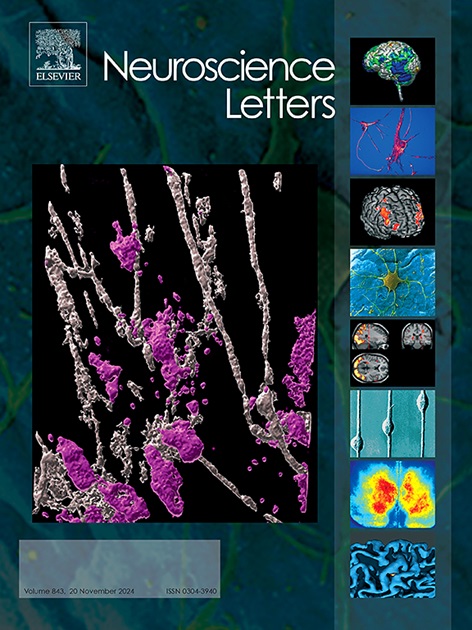The leptin/BDNF/TrkB signaling pathway improves corticosteroid combined with chronic restraint stress-induced depressive-like behavior in mice
IF 2.5
4区 医学
Q3 NEUROSCIENCES
引用次数: 0
Abstract
This study explored the effect and mechanism of leptin on depressive-like behavior induced by chronic corticosterone injections combined with chronic restraint stress (CORT-CRS) in mice. Differentially expressed genes (DEGs) were extracted using the Gene Expression Omnibus database and Sangerbox tool. Construct protein–protein interaction networks of target DEGs using Cytoscape software, and hub genes brain-derived neurotrophic factor (BDNF) were identified. A mouse model of depression was established using CORT-CRS. Behavioral changes were detected in the mice using the tail suspension, forced swimming, sugar water preference (SPT), and open field tests (OFT). Serum inflammatory factors were measured by Enzyme-linked immunosorbent assay (ELISA). Western blotting was used to detect the protein expression levels of BDNF and tyrosine kinase receptor B (TrkB). Immunofluorescence was used to detect hippocampal neurogenesis in each mouse group. Compared with the control group, mice in the CORT-CRS group presented with marked depression-like behavior and a higher interleukin (IL) -6, IL-1 β, tumor necrosis factor alpha (TNF – α) concentration. Different doses of leptin reversed depressive-like behavior in the CORT-CRS model mice, with significantly increased levels of BDNF, TrkB protein expression (P < 0.01).
Furthermore, leptin promoted hippocampal neurogenesis in CORT-CRS-treated mice in vivo. Consequently, leptin alleviates CORT-CRS-induced depression-like behavior in mice by stimulating hippocampal neurogenesis. One possible mechanism could be related to the activation of the BDNF/TrkB signaling pathway, which could pave way for novel therapeutic targets that can be explored to prevent and treat depression.
瘦素/BDNF/TrkB信号通路改善皮质类固醇联合慢性约束应激诱导的小鼠抑郁样行为。
本研究探讨瘦素对慢性皮质酮注射联合慢性约束应激(CORT-CRS)诱导小鼠抑郁样行为的影响及机制。使用基因表达Omnibus数据库和Sangerbox工具提取差异表达基因(deg)。利用Cytoscape软件构建目标deg蛋白-蛋白相互作用网络,并鉴定中枢基因脑源性神经营养因子(BDNF)。采用CORT-CRS建立小鼠抑郁模型。采用悬尾、强迫游泳、糖水偏好(SPT)和野外试验(OFT)检测小鼠的行为变化。采用酶联免疫吸附试验(ELISA)检测血清炎症因子。Western blotting检测BDNF和酪氨酸激酶受体B (TrkB)蛋白表达水平。采用免疫荧光法检测各组小鼠海马神经发生情况。与对照组相比,CORT-CRS组小鼠表现出明显的抑郁样行为,白细胞介素(IL) -6、IL-1 β、肿瘤坏死因子α (TNF - α)浓度升高。不同剂量的瘦素逆转了CORT-CRS模型小鼠的抑郁样行为,显著增加了BDNF、TrkB蛋白的表达水平(P
本文章由计算机程序翻译,如有差异,请以英文原文为准。
求助全文
约1分钟内获得全文
求助全文
来源期刊

Neuroscience Letters
医学-神经科学
CiteScore
5.20
自引率
0.00%
发文量
408
审稿时长
50 days
期刊介绍:
Neuroscience Letters is devoted to the rapid publication of short, high-quality papers of interest to the broad community of neuroscientists. Only papers which will make a significant addition to the literature in the field will be published. Papers in all areas of neuroscience - molecular, cellular, developmental, systems, behavioral and cognitive, as well as computational - will be considered for publication. Submission of laboratory investigations that shed light on disease mechanisms is encouraged. Special Issues, edited by Guest Editors to cover new and rapidly-moving areas, will include invited mini-reviews. Occasional mini-reviews in especially timely areas will be considered for publication, without invitation, outside of Special Issues; these un-solicited mini-reviews can be submitted without invitation but must be of very high quality. Clinical studies will also be published if they provide new information about organization or actions of the nervous system, or provide new insights into the neurobiology of disease. NSL does not publish case reports.
 求助内容:
求助内容: 应助结果提醒方式:
应助结果提醒方式:


